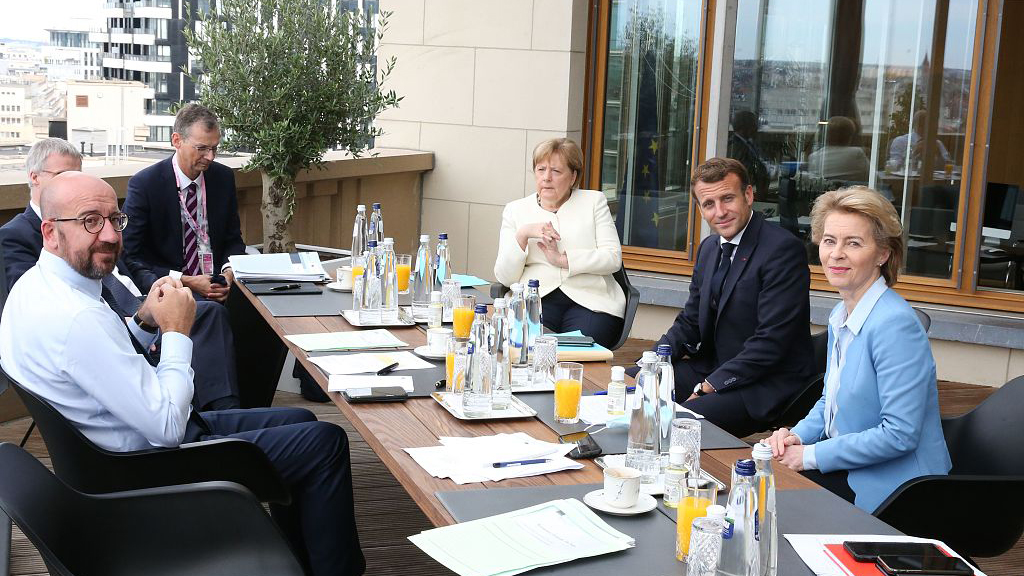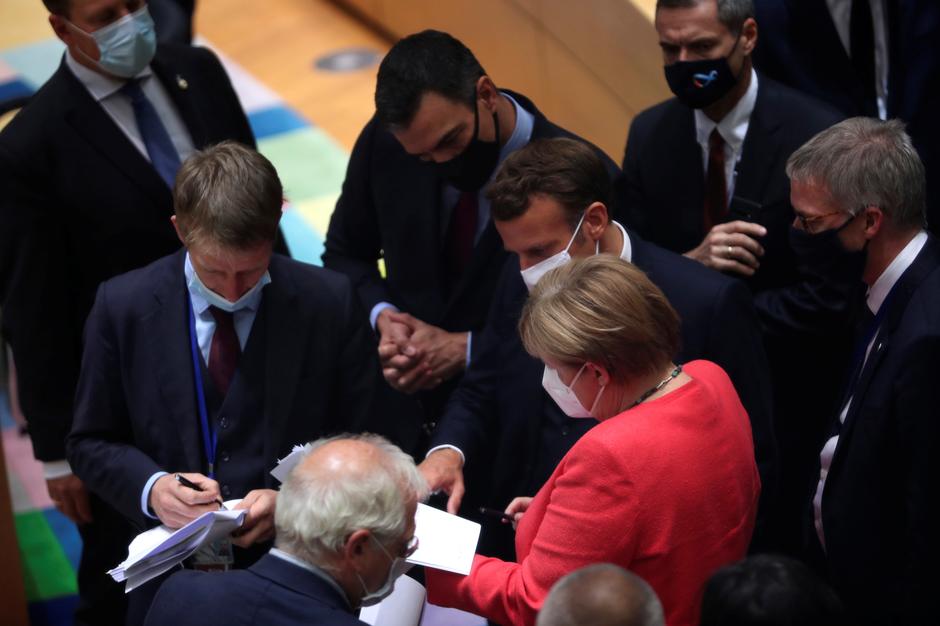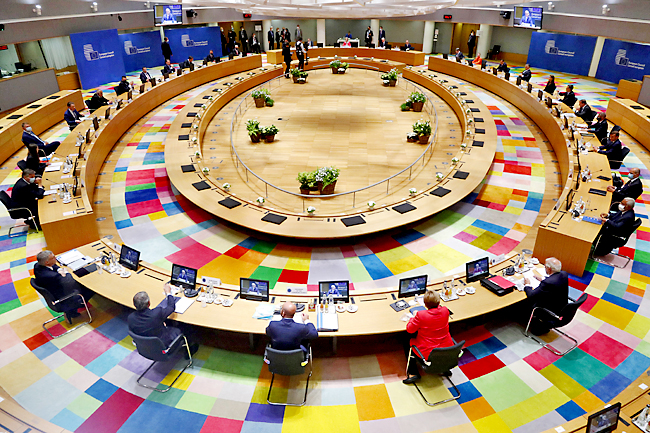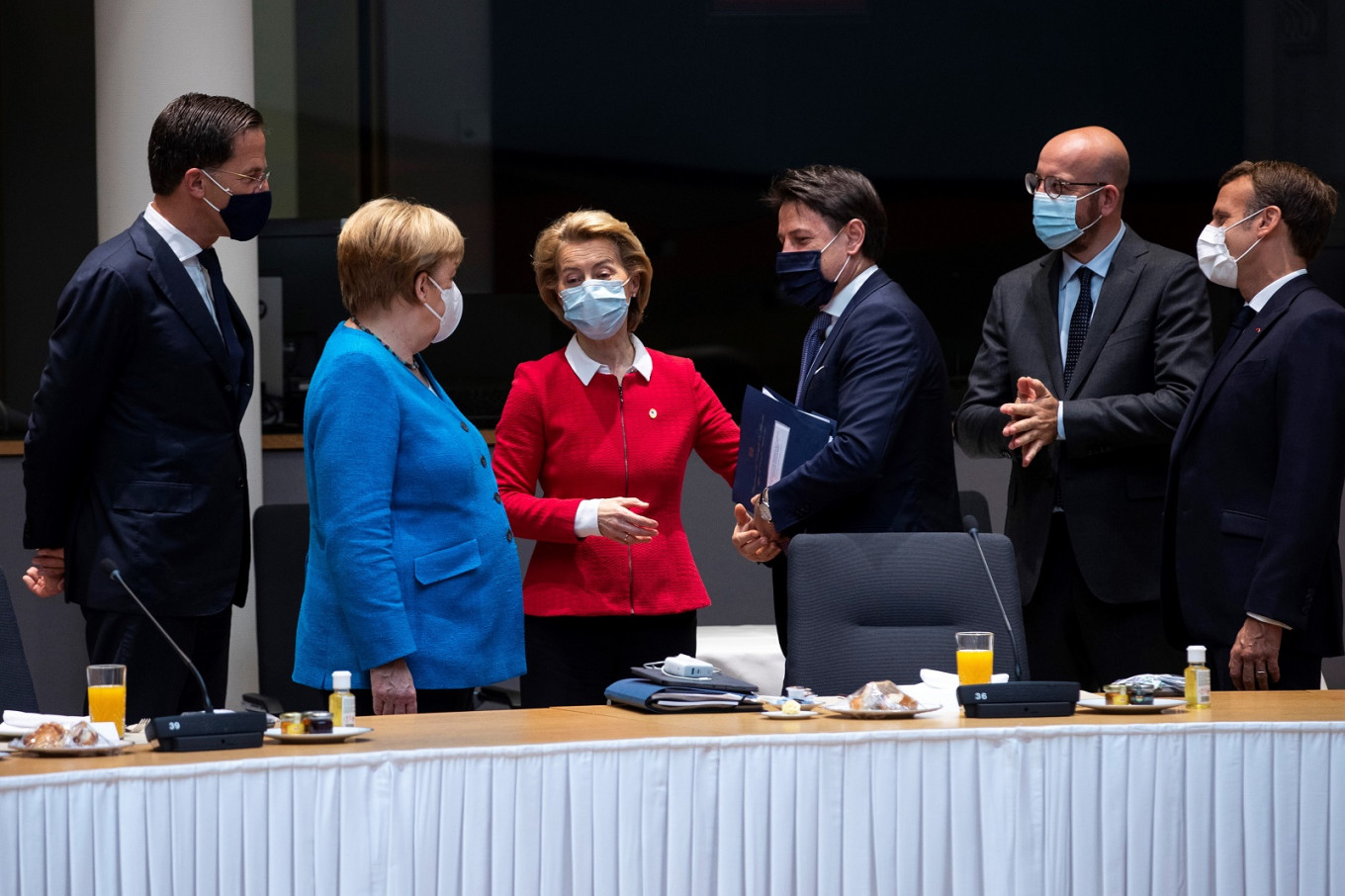01:58

European Union leaders reached a deal on a massive 1.82-trillion-euro (2.1 trillion U.S. dollars) stimulus plan for their coronavirus-blighted economies at a pre-dawn meeting on Tuesday after a fractious summit that went through the night and into its fifth day in Brussels, Belgium.
The leaders reached a consensus on a 750 billion euro coronavirus fund to be sent as loans and grants to the countries hit hardest by the virus. Summit chairman Charles Michel tweeted "Deal" shortly after the 27 leaders reached agreement at a 5.15 a.m. (0315 GMT) plenary session.

Officials said the deal, which came after Michel presented compromises on a 750-billion-euro recovery fund, is critical to dispel doubts about the bloc's very future. European Union leaders found unity after marathon meetings over money and power, after the chairman presented a new proposal to bridge gaps between them.
To confront the biggest recession in its history, officials said the EU had as good as a consensus on a 750 billion euro coronavirus fund to be sent as loans and grants. That comes on top of the seven-year 1 trillion euro EU budget. At first the grants were to total 500 billion euros, but the figure was brought down to 390 billion euros.
"I know that the last steps are always the most difficult, but I am convinced that an agreement is possible," EU Council President Charles Michel said.
The EU was slow to coordinate its initial response to the COVID-19 pandemic and, already weakened by Britain's departure from the bloc, it needs the deal on economic aid to demonstrate publicly that it can step up to a crisis and stay united.

The European leaders mull a proposal from the five wealthy northern nations that suggested a coronavirus recovery fund with 350 billion euros of grants and the same amount in loans at their summit in Brussels, Belgium, July 20, 2020. /Reuters
The European leaders mull a proposal from the five wealthy northern nations that suggested a coronavirus recovery fund with 350 billion euros of grants and the same amount in loans at their summit in Brussels, Belgium, July 20, 2020. /Reuters
Emotions ran high at a dinner on Sunday as a group of fiscally frugal northern nations led by the Netherlands stood their ground on the level of free grants within a proposed special recovery fund of 750 billion euros overall.
The leaders mulled a proposal from the five wealthy northern nations that suggested a coronavirus recovery fund with 350 billion euros of grants and the same amount in loans. The five EU nations - nicknamed "the frugals" – had long opposed any grants at all, while the EU executive had proposed 500 billion euros.
"An extraordinary situation demands extraordinary efforts," German Chancellor Angela Merkel said as the leaders pushed on with one of the bloc's longest summits ever.
French President Emmanuel Macron lost patience in the early hours of Monday, according to two diplomats. Polish Prime Minister Mateusz Morawiecki also railed against the "frugals," branding them "a group of stingy, egotistic states" that looked at things through the prism of their own interests.
Poland would be a top beneficiary of the recovery package, receiving tens of billions of euros in grants and cheap loans, along with high-debt Mediterranean-rim countries that have taken the brunt of the pandemic in Europe.

The special COVID-19 recovery European Council. /AP
The special COVID-19 recovery European Council. /AP
A diplomat from a big EU nation said the major issues had been dealt with, but that some member states were looking for final small concessions in the 7-year budget. A diplomat from another nation concurred but said such issues could still take a few hours. All officials spoke on condition of anonymity because the talks were still ongoing.
Overall, spirits were high early Tuesday since the talks hit rock bottom Sunday night.
With Macron and Merkel negotiating as the closest of partners, the traditionally powerful Franco-German alliance could not get the quarreling nations in line for long.
All nations agree in principle they need to band together but the five richer countries in the north want strict controls on spending, while struggling southern nations like Spain and Italy say those conditions should be kept to a minimum. The five have been pushing for labor market and pension reforms to be linked to EU handouts and a "brake" enabling EU nations to monitor and, if necessary, halt projects that are being paid for by the recovery fund.
The latest compromise proposal stands at 390 billion euros in grants.

L-R: Dutch Prime Minister Mark Rutte, German Chancellor Angela Merkel, European Commission President Ursula von der Leyen, Italy's Prime Minister Giuseppe Conte, European Council President Charles Michel and French President Emmanuel Macron speak at the EU summit in Brussels, Belgium, July 18, 2020. /AFP
L-R: Dutch Prime Minister Mark Rutte, German Chancellor Angela Merkel, European Commission President Ursula von der Leyen, Italy's Prime Minister Giuseppe Conte, European Council President Charles Michel and French President Emmanuel Macron speak at the EU summit in Brussels, Belgium, July 18, 2020. /AFP
Despite the continued rhetorical skirmishing on Monday, diplomats from across the bloc sounded optimistic that an accord on the stimulus package and, linked to it, the EU's 2021-2027 common budget of around 1.1 trillion euros, were at hand.
Michel proposed that within the 750 billion euro recovery fund, 390 billion should be non-repayable grants, down from 500 billion originally proposed, and the rest in repayable loans.
The diplomat from the major EU nation said that had been settled too but no details were available.
European nations have done a better job of containing the coronavirus than the United States after a devastating early few months that hit Italy and Spain particularly hard, collaborating on medical, travel and economic fronts.
The European Central Bank has pumped unparalleled money into economies to keep them going, while capitals hammer out their recovery fund.
The coronavirus has sent the EU into a tailspin. As of 20 July 2020, over 1.6 million cases of COVID-19 have been reported, including around 180,586 deaths, plunging its economy into an estimated contraction of 8.3 percent this year.
(With input from agencies)
(Cover image: Spain's Prime Minister Pedro Sanchez (L), France's President Emmanuel Macron (C) and German Chancellor Angela Merkel (R) look into documents during the face-to-face EU summit in Brussels, Belgium, July 20, 2020. /Reuters)